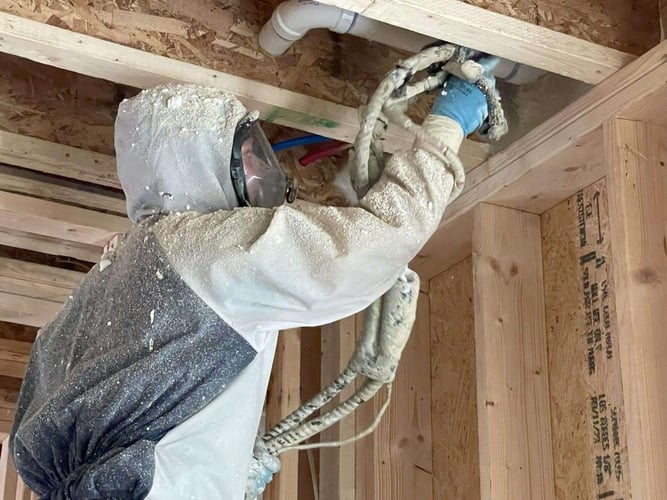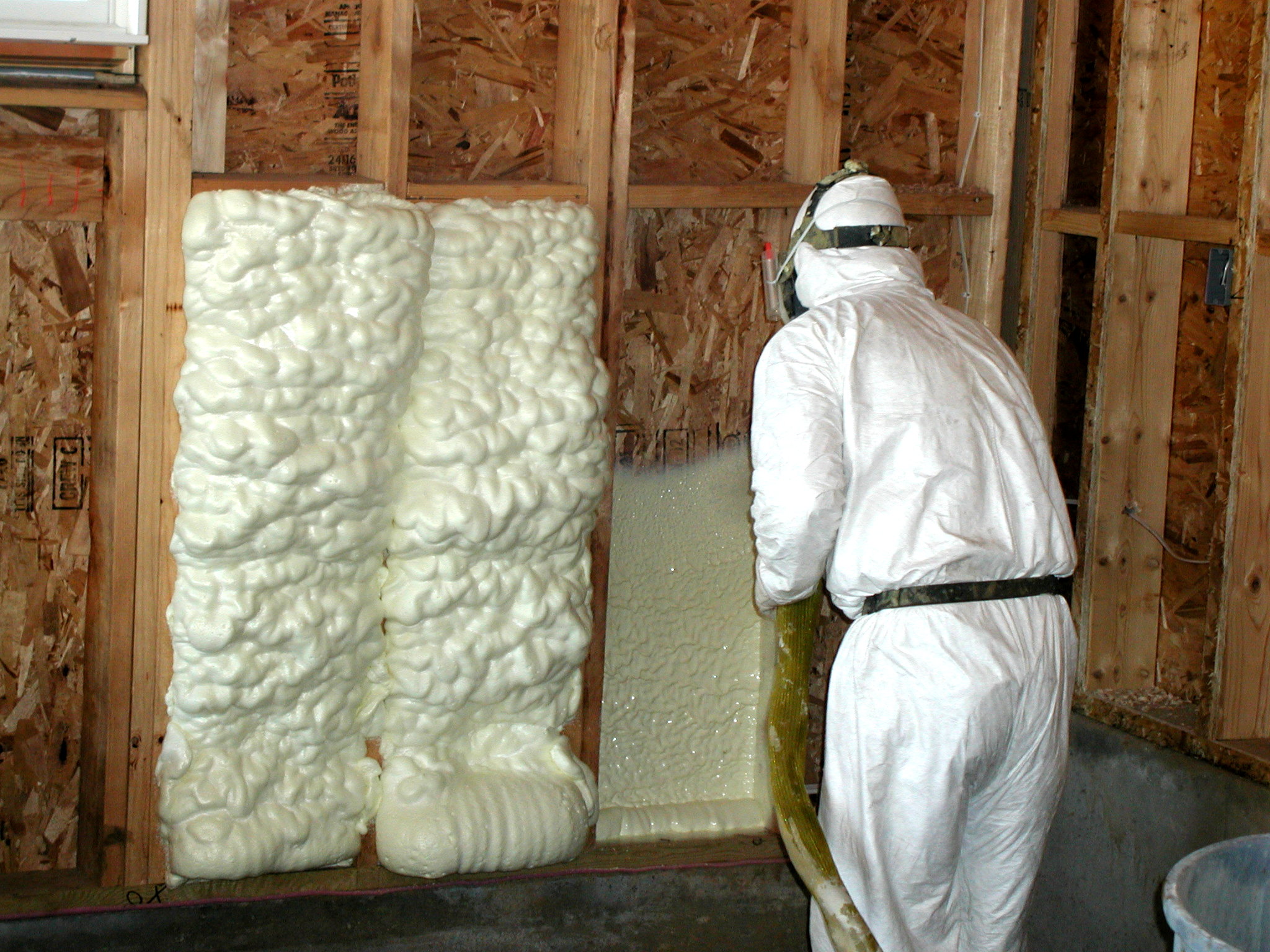Picking the Right Type of Spray Foam for Your Insulation Demands
Picking the Right Type of Spray Foam for Your Insulation Demands
Blog Article
Spray Foam: The Ultimate Remedy for Air Sealing and Insulation
Spray foam insulation has actually emerged as a leading option for reliable air securing and thermal insulation, supplying an one-of-a-kind mix of residential or commercial properties that set it apart from conventional techniques. Comprehending the full scope of its advantages, setup processes, and comparisons with various other insulation kinds is vital for making notified decisions.
What Is Spray Foam?
Spray foam is a versatile insulation product that integrates the principles of air securing and thermal resistance to boost energy efficiency in structures. Composed primarily of polyurethane or various other comparable compounds, spray foam is applied as a fluid that expands upon call with surfaces, creating a strong, continuous layer of insulation. This unique home allows it to fill up gaps, splits, and spaces that traditional insulation products may forget, supplying a superior air seal.
There are 2 main sorts of spray foam: open-cell and closed-cell. Open-cell spray foam is lighter and extra versatile, offering exceptional sound absorption and a reduced R-value per inch - Spray Foam. On the other hand, closed-cell spray foam is denser, supplying a higher R-value, dampness resistance, and added architectural integrity to developing parts
The application process typically includes specialized devices, ensuring a seamless application that complies with various substrates, consisting of steel, timber, and concrete. This versatility makes spray foam suitable for both new building and constructions and retrofitting existing frameworks. Its capability to develop an impermeable barrier substantially adds to decreasing energy intake and improving indoor air top quality, thereby making it a favored option amongst builders and house owners alike.
Benefits of Spray Foam Insulation
One of one of the most substantial benefits of spray foam insulation is its exceptional capability to develop a continual air obstacle, which properly minimizes energy loss. Unlike traditional insulation materials, spray foam broadens to fill up spaces and fractures, making sure that air leak is substantially reduced. This characteristic not just boosts power performance however likewise causes reduce utility bills in time.
Additionally, spray foam insulation provides superior thermal resistance, adding to an extra secure interior atmosphere. Its high R-value per inch permits effective insulation in constrained rooms, making it suitable for attics, walls, and crawl spaces. The moisture-resistant properties of spray foam aid avoid mold and mold development, promoting much healthier living conditions.
Another essential benefit of spray foam insulation is its sound-dampening high qualities (Spray Foam). It effectively minimizes noise transmission in between spaces, creating a quieter and more comfortable home environment. The longevity of spray foam likewise stands out, as it does not droop or work out gradually, maintaining its efficiency throughout its lifespan
Just How Spray Foam Works
Comprehending how spray foam insulation functions is important for valuing its efficiency in air securing and thermal resistance. Spray foam insulation consists of 2 key elements: isocyanate and polyol material. When these components are combined, they undergo a chain reaction that creates the material to broaden swiftly, creating a dense foam that loads cracks, spaces, and dental caries.
As the foam broadens, it sticks to surface areas, forming an airtight seal that substantially lowers air infiltration. This characteristic makes spray foam insulation extremely reliable at preventing drafts and wetness penetration, which can cause power loss and damages with time. Additionally, the closed-cell variation of spray foam provides remarkable thermal resistance as a result of its inflexible framework, properly minimizing heat transfer.
The distinct properties of spray foam allow it to satisfy irregular surfaces, making certain comprehensive protection and a smooth barrier. Because of this, spray foam insulation not just boosts energy performance but likewise contributes to boosted indoor air high quality by minimizing the build-up of pollutants and irritants. Inevitably, recognizing the auto mechanics behind spray foam highlights its role as a superior choice for insulation and air sealing in both household and business applications.
Installation Refine Summary

Before installment, the room should be sufficiently cleansed and prepped, ensuring that surfaces are devoid of debris, wetness, and dirt. This step is important due to the fact that impurities can compromise adhesion and general performance. Once the area is prepared, the application entails blending both components of the spray foam, which expands upon contact and fills gaps efficiently.
Trained specialists need to perform the installment, making use of customized visit this site tools to make certain consistent insurance coverage and optimum density. Security safety measures, including wearing protective equipment and making certain correct air flow, are essential throughout this procedure. After application, the foam commonly treatments rapidly, forming a solid barrier that boosts energy performance.
Comparing Spray Foam to Typical Insulation
When reviewing insulation alternatives, spray foam insulation sticks out in contrast to conventional materials such as fiberglass and cellulose. Among the main advantages of spray foam is its superior air securing abilities. Unlike fiberglass and cellulose, which can allow air seepage, spray foam broadens upon application, filling crevices and voids to produce an airtight seal. This causes boosted power efficiency, as less heated or cooled down air gets away the home, resulting in reduced energy bills.
In addition, spray foam offers a higher R-value per inch than traditional insulation kinds, offering more read this article reliable thermal resistance in a thinner profile. This particular is particularly beneficial in rooms with restricted cavity depth. In addition, spray foam is resistant to dampness and mold growth, which can be a substantial issue with cellulose and fiberglass, particularly in moist environments.
Nonetheless, spray foam insulation generally brings a greater upfront cost than its standard equivalents. Homeowners have to weigh this preliminary financial investment versus lasting power savings and performance benefits. Eventually, while both insulation types serve their function, spray foam becomes an advanced remedy for modern insulation needs, particularly in terms of air sealing and thermal performance.

Conclusion
In recap, spray foam insulation stands for an extremely reliable remedy for accomplishing ideal air securing and thermal resistance. Its one-of-a-kind homes, including moisture resistance and sound dampening, make it suitable for numerous applications in both brand-new buildings and retrofitting jobs (Spray Foam). The initial prices might be higher contrasted to typical insulation products, the long-lasting advantages, such as considerable energy financial savings and enhanced indoor air top quality, validate the investment and underscore its worth in contemporary building practices.
Spray foam insulation has actually arised as a leading service for effective air securing and thermal insulation, providing a special combination of properties that establish it apart from conventional approaches.Spray foam is a flexible insulation product that integrates the concepts of air sealing and thermal resistance to boost energy effectiveness in structures.When assessing insulation options, spray foam insulation stands out in comparison to typical materials such as fiberglass and cellulose. Eventually, while both insulation kinds serve their objective, spray foam emerges as a much this contact form more innovative option for modern insulation requirements, specifically in terms of air sealing and thermal effectiveness.
In recap, spray foam insulation represents an extremely reliable solution for achieving optimal air sealing and thermal resistance.
Report this page